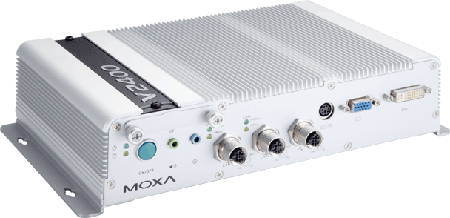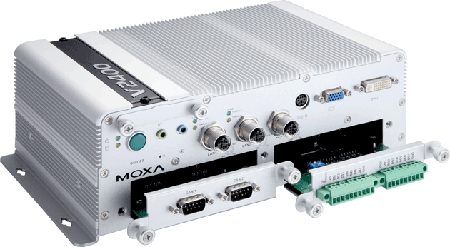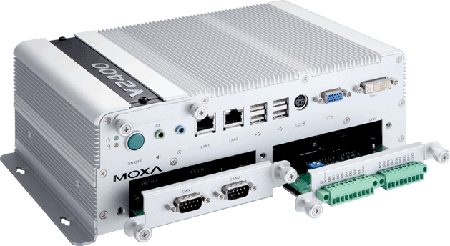Transportation PCs include M12 connectors, expansion modules
Oct 1, 2010 — by LinuxDevices Staff — from the LinuxDevices Archive — 3 viewsMoxa rolled out three fanless, Intel Atom N270-based computers aimed at railway and vehicle applications. The V2406 includes Ethernet ports with M12-type connectors; the V2426 provides the same while adding proprietary expansion slots; and the V2422 offers the same slots while switching to standard RJ45 connectors, the company says.
According to Moxa, its three Atom-based computers (all using the 1.6GHz Atom N270 along with the usual 945GSE northbridge and ICH7M southbridge) are designed for transportation applications, where they offer fanless operation and network redundancy. The V2406 and V2426 are designed for railway use and include M12 Ethernet connectors as well as EN50155 and EN50121 certifications, while the V2422 is intended for road vehicles and has standard RJ45 connectors, the company says.
Moxa V2406
According to Moxa, the V2406 has 1GB of built-in RAM, with a 200-pin DIMM slot that accepts a further 1GB, and also includes an integral 2GB DOM (disk-on-module) for storing either Linux or Windows Embedded Standard 2009 operating systems. The PC is also said to offer a Type I/II CompactFlash slot and a SATA-150 connector, for hard disk expansion.
In addition to the CompactFlash slot, protected by a screw-attached door, the V2406's front panel offers audio I/O plus both VGA (resolution to 2048 x 1536 pixels) and DVI-I (resolution to 1600 x 1200 pixels) video outputs. It also has 3.5mm jacks for audio I/O (line in, line out) and a PS/2 port, Moxa says.

Moxa's V2406
(Click to enlarge)
In contrast to these standard connectors, the front-mounted gigabit Ethernet ports and USB 2.0 host port employ M12 connectors. The V2406's rear panel, meanwhile, has two additional USB 2.0 ports with Type A connectors, four serial ports (RS232/422/485) with DB9 connectors, and terminals for six digital inputs and two digital outputs, according to Moxa.
According to Moxa, the V2406 accepts input power ranging from 12 to 48VDC, with a consumption of approximately 26 Watts. The standard operating range is -13 to 131 deg. F, but wide-temperature variants (-40 to 158 deg. F) are also available, the company adds.
Features and specifications listed by Moxa for the V2406 include:
- Processor — Intel Atom N270 clocked at 1.6GHz
- Chipset — 945GSE northbridge and ICH7M southbridge
- Memory — 1GB of RAM onboard; additional 1GB via SODIMM slot
- Storage — 2GB DOM (disk on module), plus SATA-150 connector
- Expansion — Type I/II CompactFlash
- Networking — 2 x gigabit Ethernet (M12 connectors)
- Other I/O:
- VGA
- DVI-I
- PS/2
- 3 x USB 2.0 (1 M12, 2 Type A)
- 4 x serial (RS232/422/485)
- 6 x DI and 2 x DO
- Power — 12 to 48VDC; 26 Watts
- Operating temperature — -13 to 131 deg. F (-25 to 55 deg. C) standard; -40 to 158 deg. F (-40 to 85 deg. C) wide-temperature
- Dimensions — 9.84 x 6.06 x 2.24 inches
- Weight — 4.4 pounds (2kg)
Moxa V2426
Moxa's V2426 has the same hardware characteristics as the V2406 described above, with identical ports front and rear. The only difference, apart from the device's height, is the provision of two expansion slots designed to accept proprietary I/O modules sold by Moxa.

Moxa's V2426
(Click to enlarge)
According to Moxa, the modules include:
- The EPM-3337, which offers 802.11a/b/g/n wireless local area networking and GSM/GPRS/EDGE/HSDPA cellular
- The EPM-3112, which provides two isolated CAN ports with DB9 connectors
- The EPM-3438, with eight DIs and DOs with digital isolation protection
- The EPM-3032, featuring two isolated RS232/422/485 ports with DB9 connectors
- The EPM-DK01-MPCI, providing Mini PCI expansion and an antenna connector
- The EPM-DK01-MPCIE, featuring PCI Express expansion with an antenna connector
Features and specifications listed by Moxa for the V2426 include:
- Processor — Intel Atom N270 clocked at 1.6GHz
- Chipset — 945GSE northbridge and ICH7M southbridge
- Memory — 1GB of RAM onboard; additional 1GB via SODIMM slot
- Storage — 2GB DOM (disk on module), plus SATA-150 connector
- Expansion — Type I/II CompactFlash; two slots for proprietary expansion modules
- Networking — 2 x gigabit Ethernet (M12 connectors)
- Other I/O:
- VGA
- DVI-I
- PS/2
- 3 x USB 2.0 (1 M12, 2 Type A)
- 4 x serial (RS232/422/485)
- 6 x DI and 2 x DO
- Power — 12 to 48VDC; 48 Watts
- Operating temperature — -13 to 131 deg. F (-25 to 55 deg. C) standard; -40 to 158 deg. F (-40 to 85 deg. C) wide-temperature
- Dimensions — 9.84 x 6.06 x 3.39 inches
- Weight — 8.8 pounds (4kg)
Moxa V2422
Moxa's V2422, aimed for the roads rather than the rails, is again much the same as its stablemates, but eschews the M12 connectors in favor of standard PC-style-ports. The device has six Type A USB 2.0 ports (four front, two year), plus four digital inputs and four digital outputs.

Moxa's V2422
(Click to enlarge)
Video outputs, Ethernet ports, and serial ports are as on the V2406 and V2426. The V2422 also features the same slots for expansion modules as the V2426, according to Moxa.
Features and specifications listed by Moxa for the V2422 include:
- Processor — Intel Atom N270 clocked at 1.6GHz
- Chipset — 945GSE northbridge and ICH7M southbridge
- Memory — 1GB of RAM onboard; additional 1GB via SODIMM slot
- Storage — 2GB DOM (disk on module), plus SATA-150 connector
- Expansion — Type I/II CompactFlash; two slots for proprietary expansion modules
- Networking — 2 x gigabit Ethernet (RJ45 connectors)
- Other I/O:
- VGA
- DVI-I
- PS/2
- 6 x USB 2.0 (Type A connectors; 4 front and 2 rear)
- 4 x serial (RS232/422/485)
- 4 x DI and 4 x DO
- Power — 12 to 48VDC; 48 Watts
- Operating temperature — -13 to 131 deg. F (-25 to 55 deg. C) standard; -40 to 158 deg. F (-40 to 85 deg. C) wide-temperature
- Dimensions — 9.84 x 6.06 x 3.39 inches
- Weight — 8.8 pounds (4kg)
Further information
Moxa did not cite pricing or availability for its new transportation computers, but the devices appear to be available now. Product pages for the V2406, V2426, and V2422 may be found here, here, and here, respectively.
This article was originally published on LinuxDevices.com and has been donated to the open source community by QuinStreet Inc. Please visit LinuxToday.com for up-to-date news and articles about Linux and open source.